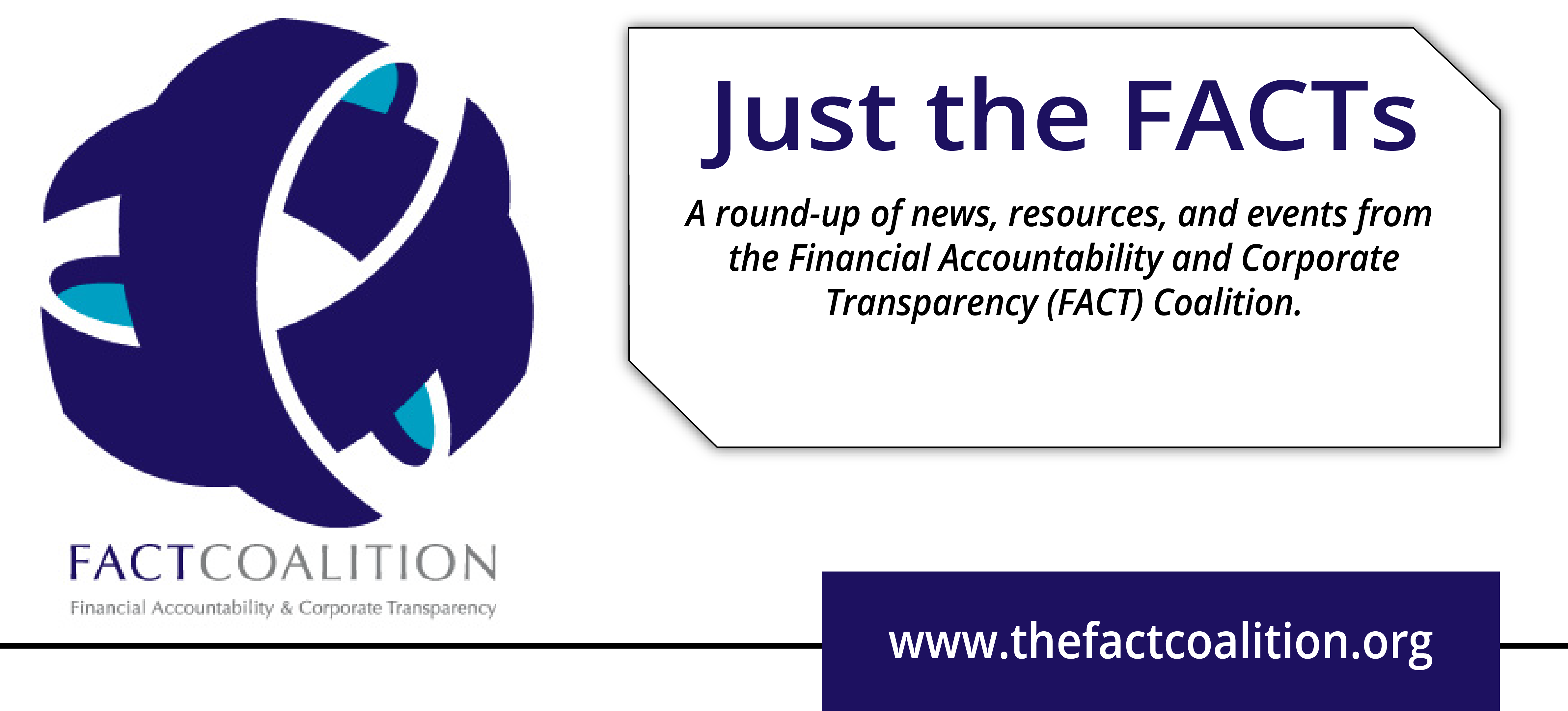“Just the FACTs” is a round-up of news stories and information regarding efforts to combat corrupt financial practices, including offshore tax haven abuses, corporate secrecy, and money laundering through the financial system.
Send feedback or items for future newsletters to Patricia Ainembabazi at painembabazi@thefactcoalition.org
Here is the State of Play
Germany leads the EU in implementing the 15% Global Minimum Tax

Germany has expressed its intention to move forward with a crucial piece of the OECD’s global tax agreement, introducing legislation to create a minimum corporate tax with or without the rest of the European Union. This may pressure lingering opposition to EU proposals to create a 15% tax country-by-country corporate tax floor consistent with the OECD Agreement, and it could also increase pressure on the United States to implement similar international tax reforms in light of the failure to do so in connection with the Inflation Reduction Act. FACT has long advocated for the U.S. adoption of the OECD Agreement.
Last October, one hundred thirty-seven jurisdictions agreed to a two-pillar solution to address the digitalization of the global economy. Pillar 1 of the solution would reallocate taxing rights relating to excess profits of the world’s largest companies. Pillar 2 of the solution would create a global 15% minimum corporate tax applied on a country-by-country basis for those corporations with annual revenue in excess of €750 million.
In December, the European Commission released a draft directive for Pillar 2, but Hungary has blocked adoption of the directive, supported by questionable motives and friends. EU rules typically require unanimous consent for tax rules that implicate cross-border taxation; however, Germany has indicated that Pillar 2, which applies equally to domestic and foreign corporate profits, may not require unanimous consent. Separately, other EU nations, including Germany, have considered advancing Pillar 2 by Enhanced Cooperation–a measure that would allow Hungary to be excluded from adoption. For now, the EU is set to seek unanimous consent once more on October 4 at its meeting of economic and finance ministers–or Ecofin, and it remains unclear if these steps will cause Hungary to drop its objections.
Germany’s commitment to advance Pillar 2 on its own sends a strong signal to other global economies that the global minimum tax will likely survive. Pillar 2 is designed to allow implementing countries to levy top-up taxes on those multinationals–foreign or domestic–operating within their borders. When a meaningful number of economies adopt Pillar 2, there is no incentive for any jurisdiction to opt out of Pillar 2, as doing so would simply result in the forfeiture of tax revenues to those countries that do implement Pillar 2. Germany’s draft legislation follows similar formal steps from other leading global economies, including South Korea, the United Kingdom (subject to the recent change in Tory leadership), and others.
As FACT previously wrote, the United States failed to implement Pillar 2 as part of the Inflation Reduction Act (IRA). Instead, the IRA created a new 15% worldwide corporate alternative minimum tax (CAMT) for the largest global multinationals that do not apply on a country-by-country basis. While CAMT reconfirms the U.S. commitment to ensuring large multinationals pay a minimum level of tax, FACT continues to advocate for the United States to move forward with legislation to implement Pillar 2. This requires reforming the current U.S. minimum tax on offshore profits to apply on a country-by-country basis at a 15% rate and to reform the base-erosion and anti-abuse tax (BEAT) to close obvious loopholes and conform with Pillar 2. Failing to do so in light of Germany and other nations’ progress will simply subject United States multinationals to more complicated tax rules that may inappropriately extend profit-shifting and offshoring incentives without any fiscal benefit to the United States.
News from FACT
| Press Release: FACT Recommends Key Tax Transparency Reforms as Australia Weighs Public Country-by-Country Reporting September 6: The FACT Coalition applauded the Australian Treasury for its consultation regarding its promised implementation of public country-by-country reporting (PCbCR) and encouraged the adoption of PCbCR best practices in comments filed last week. Critically, FACT encouraged Australia to (i) require disclosure with respect to every country in which a multinational operates, (ii) apply to both Australian and foreign headquartered multinationals, and (iii) utilize the Global Reporting Initiative (GRI) PCbCR standard. In light of the Australian advancements, FACT urges the U.S. Securities and Exchange Commission (SEC) to implement PCbCR best practices expeditiously to eliminate information asymmetries between multinationals, investors, policymakers, and other consumers of financial statements. |
| Op-ED: Investors Fly Blind Without Public Country-by-Country Reports August 30:Ian Gary, Executive Director at FACT Coalition, writes about how important it is for investors to know the tax strategies of companies they own and the big role the Securities Exchange Commission must play in pushing companies to disclose information to these investors utilizing PCbCR best practices. The Bloomberg opinion piece highlights FACT’s recently published report making the investor case for PCbCR from the FACT Coalition. “Patchwork PCbCR efforts are not enough, and the need for mandatory, consistent, and comprehensive regimes are clear,” Gary said. “The SEC must take a leadership role and address the chasm between what companies know and what they publicly disclose to investors. The SEC has clear statutory authority to launch a new rulemaking process to require PCbCR, and it should use this authority.” |
FACT in the News
| Quoted in: Final Transparency Regs Move Closer to Release. September 1: FACT’s advocacy efforts towards implementing the Corporate Transparency Act and increasing funding to the Treasury Department’s Financial Crimes Enforcement Network (FinCEN) are mentioned in this Tax Notes article, with emphasis on timely implementation of the CTA directory of beneficial ownership and data best practices in connection with the collection, verification, storage, and authorized disclosure of reported information. |
| Quoted in: Defense Bill Would Ramp Up Reporting for Lawyers and Tax Pros September 1: The FACT Coalition’s work to combat corruption and promote accountability in government is mentioned, highlighting a letter sent to Senate leaders calling for the passing of the ENABLERS Act. |
Recent and Upcoming Events
| September 14: Register for this ACAMS webinar, “Following the Illicit Money Flows and Shell Companies that Robbed 1MDB”. Tune in to learn from Lakshmi Kumar, of FACT-Coalition member Global Financial Integrity (GFI), to understand how dirty money moves through anonymous entities, real estate, and other high-value assets in the U.S. |
| September 22-23: Register to attend – The 4th World Bank Tax Conference: Global Tax Equity This conference brings together prominent researchers and policymakers to discuss the latest studies on making global tax systems more equal, such as the Taxation of high-net-worth individuals, including wealth taxation; Tax transparency, beneficial ownership, offshoring, and tax havens; Taxes on multinationals and large corporations, including BEPS pillar I and II. |
Social Media Shoutouts
@ChrisVanHollen: Americans shouldn’t be kept in the dark about how big corporations are shipping jobs overseas & abusing offshore tax havens. The Disclosure of Tax Havens & Offshoring Act that @RepCindyAxne & I introduced would uncover these practices. Let’s pass it!
@NormEisen: Knowing who to fight is the first step in combatting corruption. On Sep 7, @JonDKatz, @AndrejLeontiev, @thomtownsend, and others join me in discussing how beneficial ownership transparency is in shaping the future fight against corruption.
@USAID: The USAID has developed a comprehensive #Dekleptification guide of lessons learned from work in several regions for staff and civil society to dismantle entrenched corruption in countries with windows of opportunity for reform.
About the FACT Coalition

